Applied Counseling Essay: Kolb's Learning Theory and Counselor Roles
VerifiedAdded on 2022/09/25
|9
|1378
|21
Essay
AI Summary
This essay provides a comprehensive overview of Kolb's Experiential Learning Theory, which is based on a four-stage learning cycle: concrete experience, reflective observation, abstract conceptualization, and active experimentation. The essay delves into the different learning styles associated with the theory, including diverging, assimilating, converging, and accommodating styles, and explains how these styles relate to the learning cycle. Furthermore, the essay explores the roles of student counselors in higher education, dividing them into academic, psychological, and career guidance. The essay highlights specific responsibilities such as providing advice, easing cultural acclimatization, offering career guidance, assisting with learning difficulties, and supporting students' mental health. The content is supported by references to relevant research and literature.
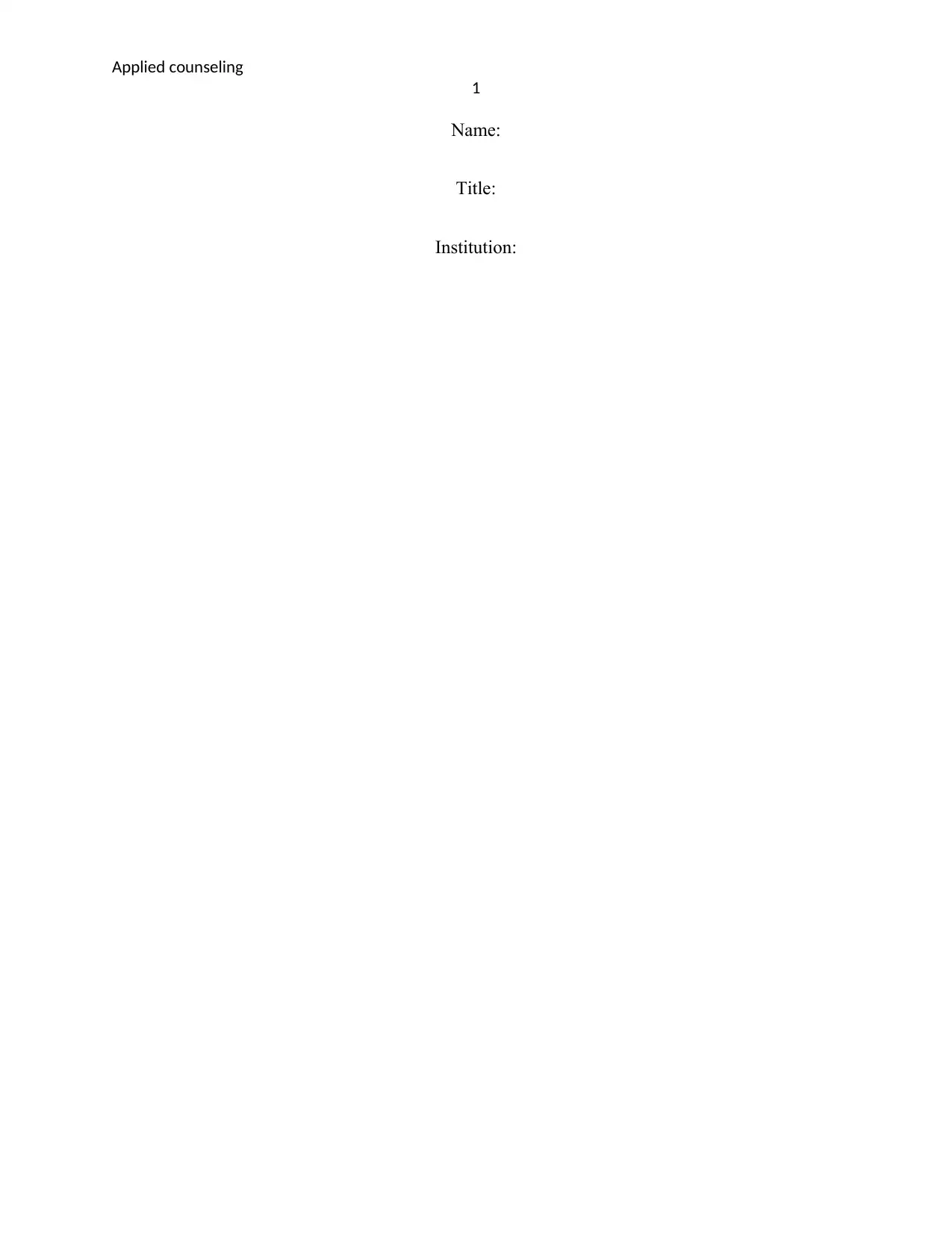
Applied counseling
1
Name:
Title:
Institution:
1
Name:
Title:
Institution:
Paraphrase This Document
Need a fresh take? Get an instant paraphrase of this document with our AI Paraphraser
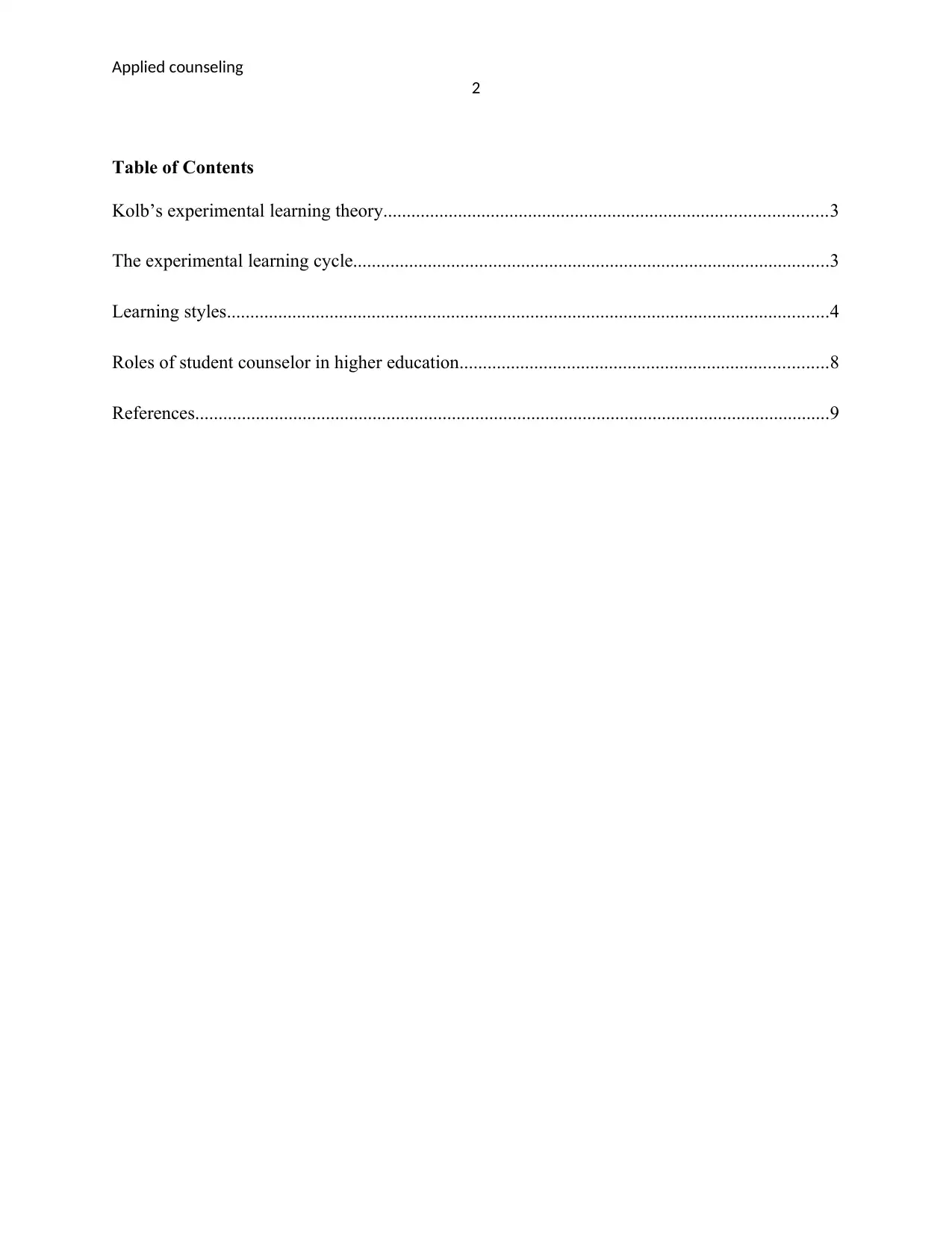
Applied counseling
2
Table of Contents
Kolb’s experimental learning theory...............................................................................................3
The experimental learning cycle......................................................................................................3
Learning styles.................................................................................................................................4
Roles of student counselor in higher education...............................................................................8
References........................................................................................................................................9
2
Table of Contents
Kolb’s experimental learning theory...............................................................................................3
The experimental learning cycle......................................................................................................3
Learning styles.................................................................................................................................4
Roles of student counselor in higher education...............................................................................8
References........................................................................................................................................9
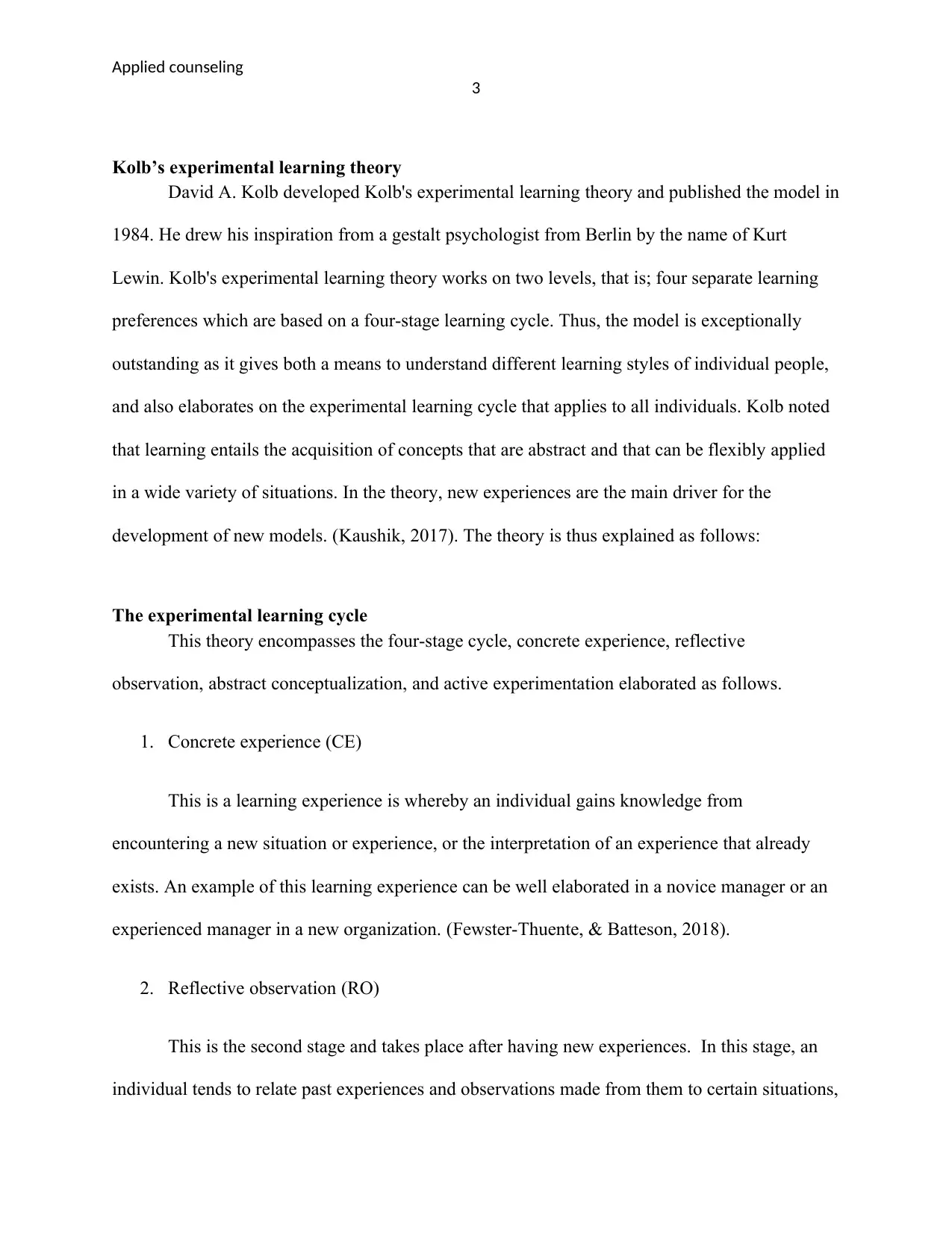
Applied counseling
3
Kolb’s experimental learning theory
David A. Kolb developed Kolb's experimental learning theory and published the model in
1984. He drew his inspiration from a gestalt psychologist from Berlin by the name of Kurt
Lewin. Kolb's experimental learning theory works on two levels, that is; four separate learning
preferences which are based on a four-stage learning cycle. Thus, the model is exceptionally
outstanding as it gives both a means to understand different learning styles of individual people,
and also elaborates on the experimental learning cycle that applies to all individuals. Kolb noted
that learning entails the acquisition of concepts that are abstract and that can be flexibly applied
in a wide variety of situations. In the theory, new experiences are the main driver for the
development of new models. (Kaushik, 2017). The theory is thus explained as follows:
The experimental learning cycle
This theory encompasses the four-stage cycle, concrete experience, reflective
observation, abstract conceptualization, and active experimentation elaborated as follows.
1. Concrete experience (CE)
This is a learning experience is whereby an individual gains knowledge from
encountering a new situation or experience, or the interpretation of an experience that already
exists. An example of this learning experience can be well elaborated in a novice manager or an
experienced manager in a new organization. (Fewster-Thuente, & Batteson, 2018).
2. Reflective observation (RO)
This is the second stage and takes place after having new experiences. In this stage, an
individual tends to relate past experiences and observations made from them to certain situations,
3
Kolb’s experimental learning theory
David A. Kolb developed Kolb's experimental learning theory and published the model in
1984. He drew his inspiration from a gestalt psychologist from Berlin by the name of Kurt
Lewin. Kolb's experimental learning theory works on two levels, that is; four separate learning
preferences which are based on a four-stage learning cycle. Thus, the model is exceptionally
outstanding as it gives both a means to understand different learning styles of individual people,
and also elaborates on the experimental learning cycle that applies to all individuals. Kolb noted
that learning entails the acquisition of concepts that are abstract and that can be flexibly applied
in a wide variety of situations. In the theory, new experiences are the main driver for the
development of new models. (Kaushik, 2017). The theory is thus explained as follows:
The experimental learning cycle
This theory encompasses the four-stage cycle, concrete experience, reflective
observation, abstract conceptualization, and active experimentation elaborated as follows.
1. Concrete experience (CE)
This is a learning experience is whereby an individual gains knowledge from
encountering a new situation or experience, or the interpretation of an experience that already
exists. An example of this learning experience can be well elaborated in a novice manager or an
experienced manager in a new organization. (Fewster-Thuente, & Batteson, 2018).
2. Reflective observation (RO)
This is the second stage and takes place after having new experiences. In this stage, an
individual tends to relate past experiences and observations made from them to certain situations,
⊘ This is a preview!⊘
Do you want full access?
Subscribe today to unlock all pages.

Trusted by 1+ million students worldwide
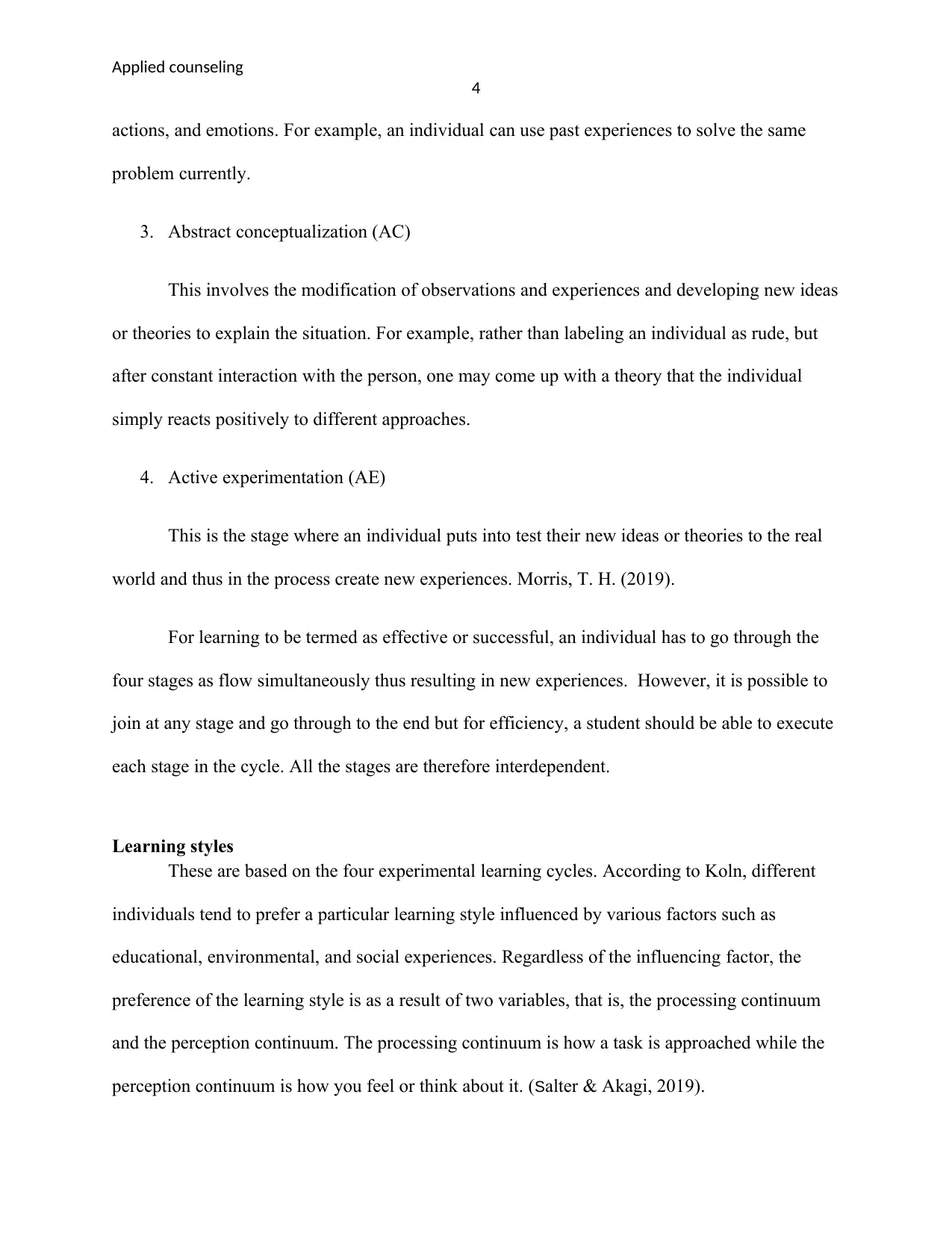
Applied counseling
4
actions, and emotions. For example, an individual can use past experiences to solve the same
problem currently.
3. Abstract conceptualization (AC)
This involves the modification of observations and experiences and developing new ideas
or theories to explain the situation. For example, rather than labeling an individual as rude, but
after constant interaction with the person, one may come up with a theory that the individual
simply reacts positively to different approaches.
4. Active experimentation (AE)
This is the stage where an individual puts into test their new ideas or theories to the real
world and thus in the process create new experiences. Morris, T. H. (2019).
For learning to be termed as effective or successful, an individual has to go through the
four stages as flow simultaneously thus resulting in new experiences. However, it is possible to
join at any stage and go through to the end but for efficiency, a student should be able to execute
each stage in the cycle. All the stages are therefore interdependent.
Learning styles
These are based on the four experimental learning cycles. According to Koln, different
individuals tend to prefer a particular learning style influenced by various factors such as
educational, environmental, and social experiences. Regardless of the influencing factor, the
preference of the learning style is as a result of two variables, that is, the processing continuum
and the perception continuum. The processing continuum is how a task is approached while the
perception continuum is how you feel or think about it. (Salter & Akagi, 2019).
4
actions, and emotions. For example, an individual can use past experiences to solve the same
problem currently.
3. Abstract conceptualization (AC)
This involves the modification of observations and experiences and developing new ideas
or theories to explain the situation. For example, rather than labeling an individual as rude, but
after constant interaction with the person, one may come up with a theory that the individual
simply reacts positively to different approaches.
4. Active experimentation (AE)
This is the stage where an individual puts into test their new ideas or theories to the real
world and thus in the process create new experiences. Morris, T. H. (2019).
For learning to be termed as effective or successful, an individual has to go through the
four stages as flow simultaneously thus resulting in new experiences. However, it is possible to
join at any stage and go through to the end but for efficiency, a student should be able to execute
each stage in the cycle. All the stages are therefore interdependent.
Learning styles
These are based on the four experimental learning cycles. According to Koln, different
individuals tend to prefer a particular learning style influenced by various factors such as
educational, environmental, and social experiences. Regardless of the influencing factor, the
preference of the learning style is as a result of two variables, that is, the processing continuum
and the perception continuum. The processing continuum is how a task is approached while the
perception continuum is how you feel or think about it. (Salter & Akagi, 2019).
Paraphrase This Document
Need a fresh take? Get an instant paraphrase of this document with our AI Paraphraser
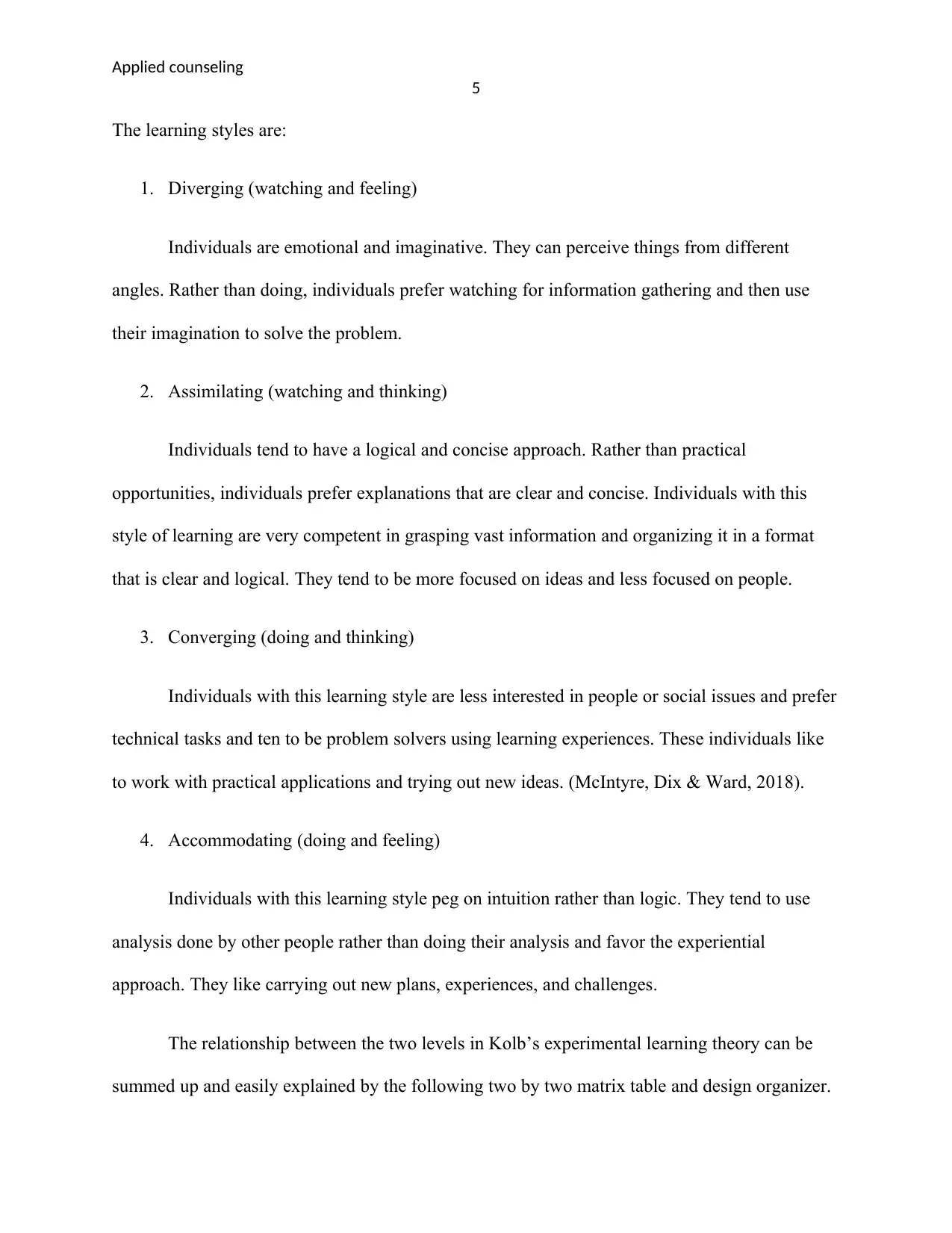
Applied counseling
5
The learning styles are:
1. Diverging (watching and feeling)
Individuals are emotional and imaginative. They can perceive things from different
angles. Rather than doing, individuals prefer watching for information gathering and then use
their imagination to solve the problem.
2. Assimilating (watching and thinking)
Individuals tend to have a logical and concise approach. Rather than practical
opportunities, individuals prefer explanations that are clear and concise. Individuals with this
style of learning are very competent in grasping vast information and organizing it in a format
that is clear and logical. They tend to be more focused on ideas and less focused on people.
3. Converging (doing and thinking)
Individuals with this learning style are less interested in people or social issues and prefer
technical tasks and ten to be problem solvers using learning experiences. These individuals like
to work with practical applications and trying out new ideas. (McIntyre, Dix & Ward, 2018).
4. Accommodating (doing and feeling)
Individuals with this learning style peg on intuition rather than logic. They tend to use
analysis done by other people rather than doing their analysis and favor the experiential
approach. They like carrying out new plans, experiences, and challenges.
The relationship between the two levels in Kolb’s experimental learning theory can be
summed up and easily explained by the following two by two matrix table and design organizer.
5
The learning styles are:
1. Diverging (watching and feeling)
Individuals are emotional and imaginative. They can perceive things from different
angles. Rather than doing, individuals prefer watching for information gathering and then use
their imagination to solve the problem.
2. Assimilating (watching and thinking)
Individuals tend to have a logical and concise approach. Rather than practical
opportunities, individuals prefer explanations that are clear and concise. Individuals with this
style of learning are very competent in grasping vast information and organizing it in a format
that is clear and logical. They tend to be more focused on ideas and less focused on people.
3. Converging (doing and thinking)
Individuals with this learning style are less interested in people or social issues and prefer
technical tasks and ten to be problem solvers using learning experiences. These individuals like
to work with practical applications and trying out new ideas. (McIntyre, Dix & Ward, 2018).
4. Accommodating (doing and feeling)
Individuals with this learning style peg on intuition rather than logic. They tend to use
analysis done by other people rather than doing their analysis and favor the experiential
approach. They like carrying out new plans, experiences, and challenges.
The relationship between the two levels in Kolb’s experimental learning theory can be
summed up and easily explained by the following two by two matrix table and design organizer.
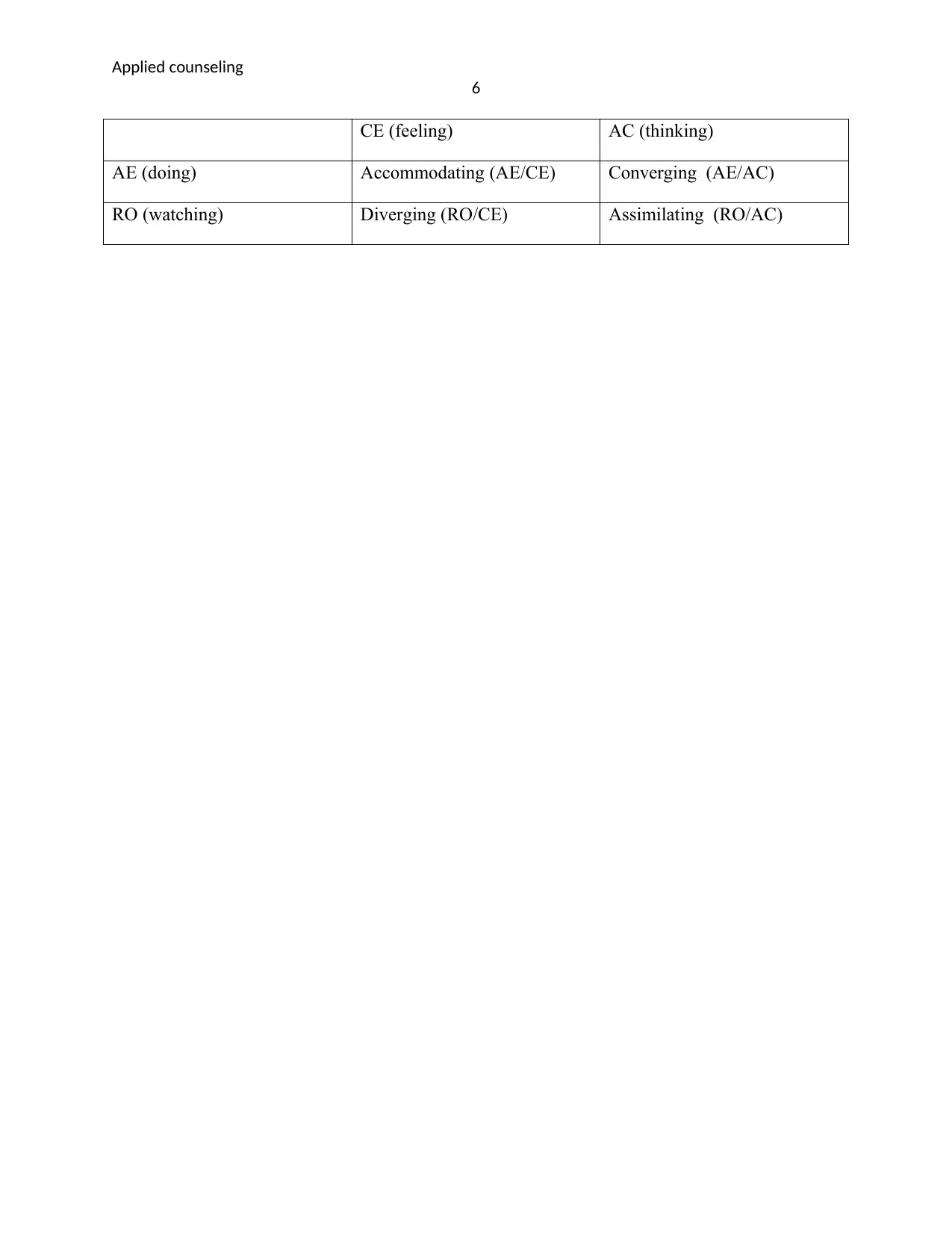
Applied counseling
6
CE (feeling) AC (thinking)
AE (doing) Accommodating (AE/CE) Converging (AE/AC)
RO (watching) Diverging (RO/CE) Assimilating (RO/AC)
6
CE (feeling) AC (thinking)
AE (doing) Accommodating (AE/CE) Converging (AE/AC)
RO (watching) Diverging (RO/CE) Assimilating (RO/AC)
⊘ This is a preview!⊘
Do you want full access?
Subscribe today to unlock all pages.

Trusted by 1+ million students worldwide
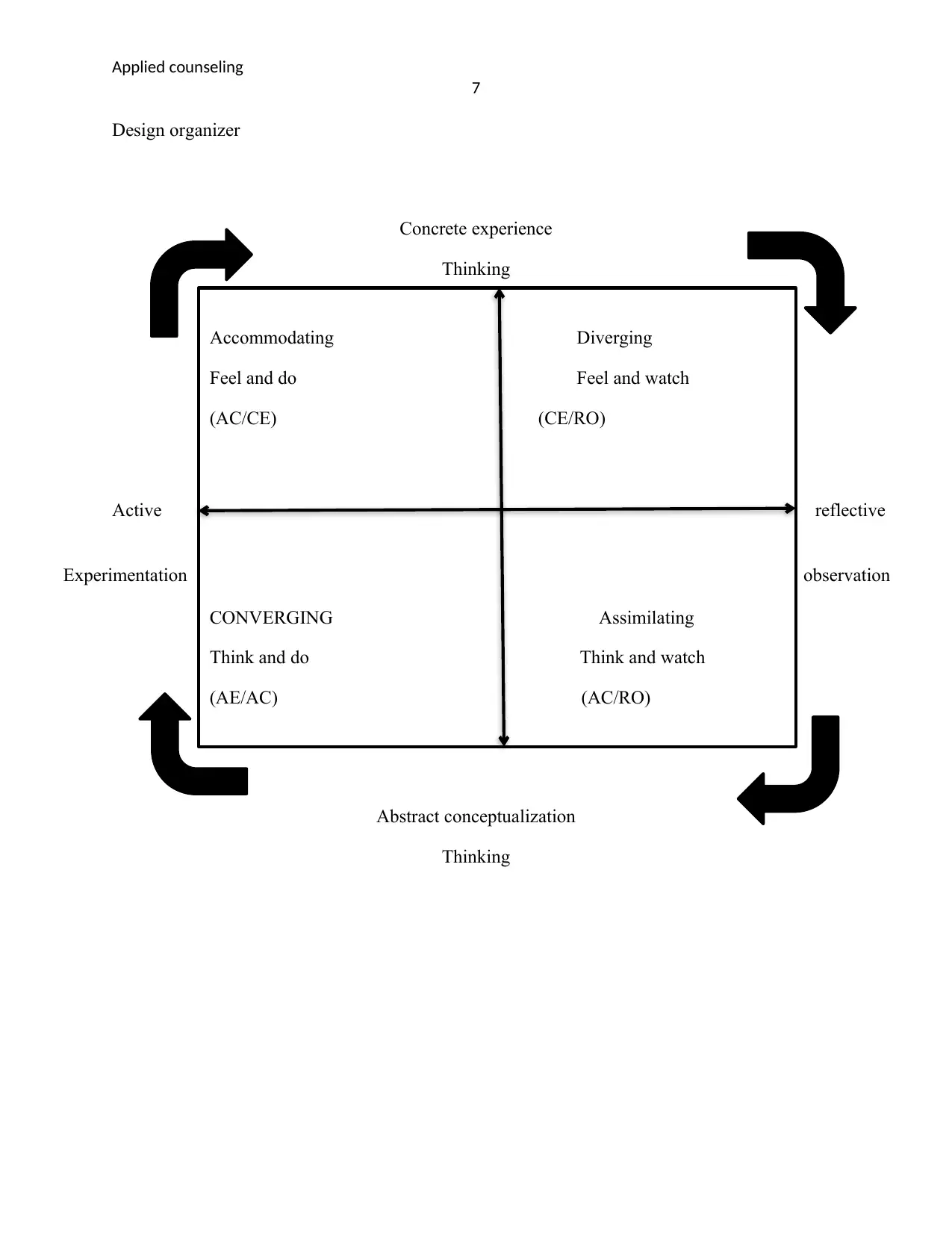
Applied counseling
7
Design organizer
Concrete experience
Thinking
Active reflective
Experimentation observation
Abstract conceptualization
Thinking
Accommodating Diverging
Feel and do Feel and watch
(AC/CE) (CE/RO)
CONVERGING Assimilating
Think and do Think and watch
(AE/AC) (AC/RO)
7
Design organizer
Concrete experience
Thinking
Active reflective
Experimentation observation
Abstract conceptualization
Thinking
Accommodating Diverging
Feel and do Feel and watch
(AC/CE) (CE/RO)
CONVERGING Assimilating
Think and do Think and watch
(AE/AC) (AC/RO)
Paraphrase This Document
Need a fresh take? Get an instant paraphrase of this document with our AI Paraphraser
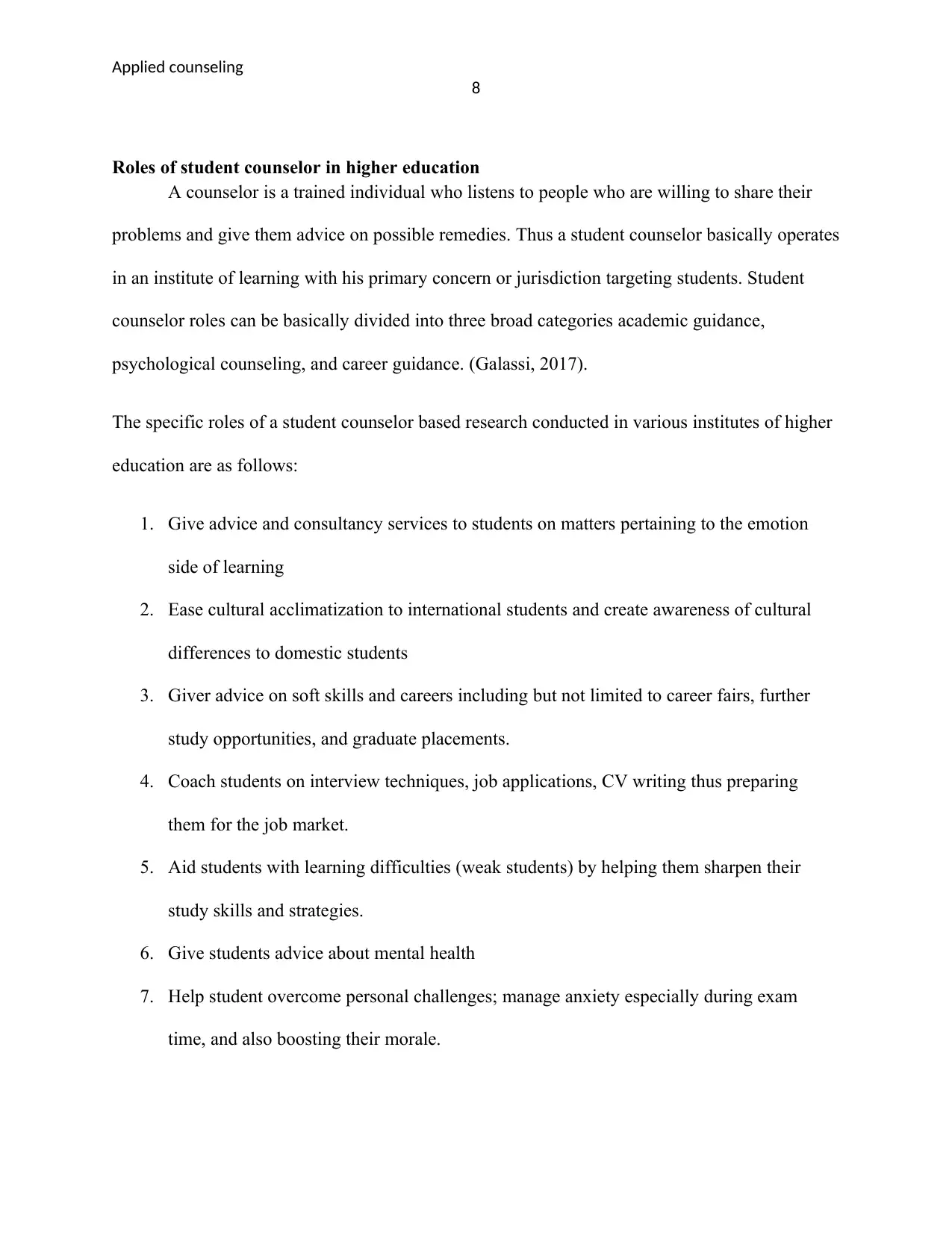
Applied counseling
8
Roles of student counselor in higher education
A counselor is a trained individual who listens to people who are willing to share their
problems and give them advice on possible remedies. Thus a student counselor basically operates
in an institute of learning with his primary concern or jurisdiction targeting students. Student
counselor roles can be basically divided into three broad categories academic guidance,
psychological counseling, and career guidance. (Galassi, 2017).
The specific roles of a student counselor based research conducted in various institutes of higher
education are as follows:
1. Give advice and consultancy services to students on matters pertaining to the emotion
side of learning
2. Ease cultural acclimatization to international students and create awareness of cultural
differences to domestic students
3. Giver advice on soft skills and careers including but not limited to career fairs, further
study opportunities, and graduate placements.
4. Coach students on interview techniques, job applications, CV writing thus preparing
them for the job market.
5. Aid students with learning difficulties (weak students) by helping them sharpen their
study skills and strategies.
6. Give students advice about mental health
7. Help student overcome personal challenges; manage anxiety especially during exam
time, and also boosting their morale.
8
Roles of student counselor in higher education
A counselor is a trained individual who listens to people who are willing to share their
problems and give them advice on possible remedies. Thus a student counselor basically operates
in an institute of learning with his primary concern or jurisdiction targeting students. Student
counselor roles can be basically divided into three broad categories academic guidance,
psychological counseling, and career guidance. (Galassi, 2017).
The specific roles of a student counselor based research conducted in various institutes of higher
education are as follows:
1. Give advice and consultancy services to students on matters pertaining to the emotion
side of learning
2. Ease cultural acclimatization to international students and create awareness of cultural
differences to domestic students
3. Giver advice on soft skills and careers including but not limited to career fairs, further
study opportunities, and graduate placements.
4. Coach students on interview techniques, job applications, CV writing thus preparing
them for the job market.
5. Aid students with learning difficulties (weak students) by helping them sharpen their
study skills and strategies.
6. Give students advice about mental health
7. Help student overcome personal challenges; manage anxiety especially during exam
time, and also boosting their morale.
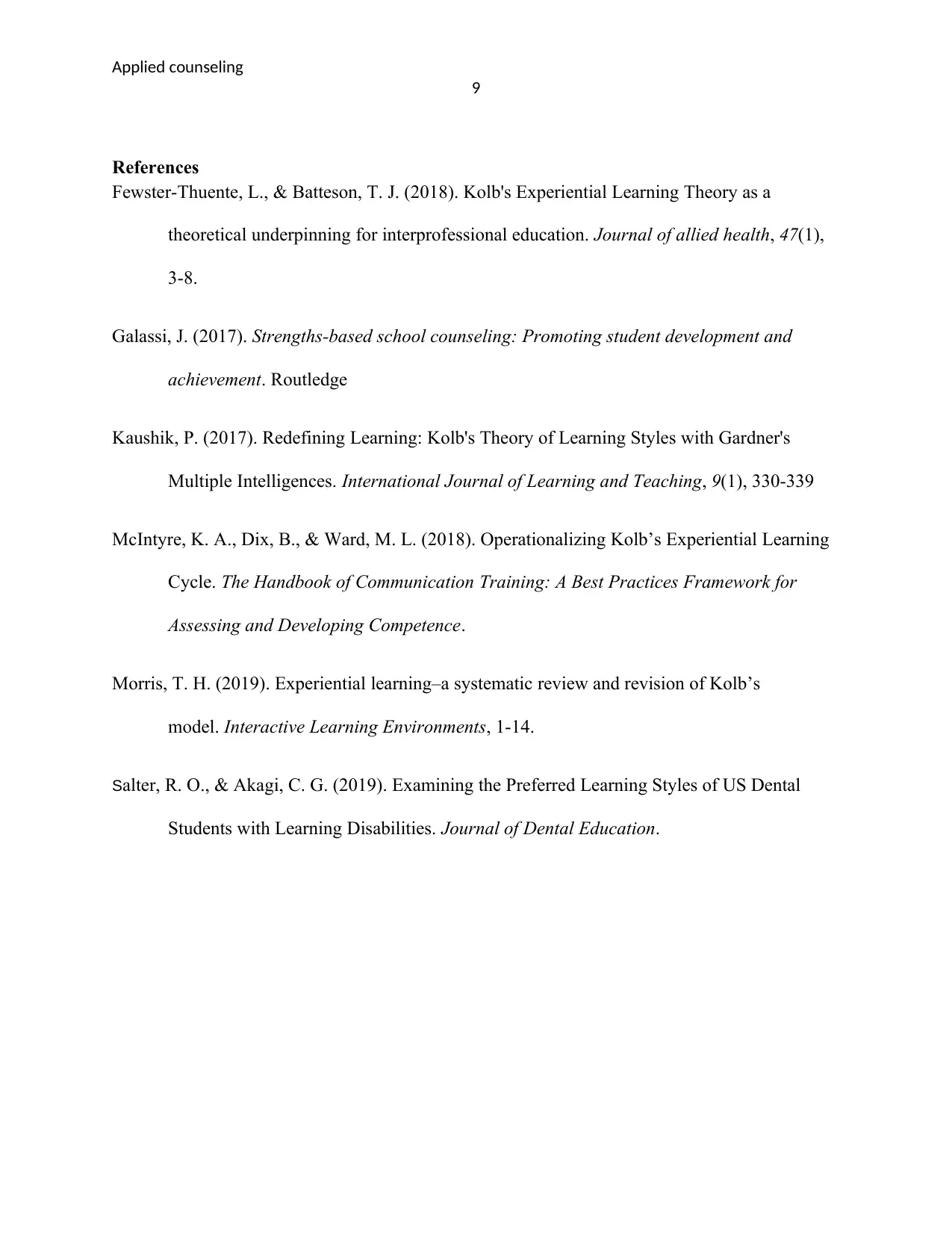
Applied counseling
9
References
Fewster-Thuente, L., & Batteson, T. J. (2018). Kolb's Experiential Learning Theory as a
theoretical underpinning for interprofessional education. Journal of allied health, 47(1),
3-8.
Galassi, J. (2017). Strengths-based school counseling: Promoting student development and
achievement. Routledge
Kaushik, P. (2017). Redefining Learning: Kolb's Theory of Learning Styles with Gardner's
Multiple Intelligences. International Journal of Learning and Teaching, 9(1), 330-339
McIntyre, K. A., Dix, B., & Ward, M. L. (2018). Operationalizing Kolb’s Experiential Learning
Cycle. The Handbook of Communication Training: A Best Practices Framework for
Assessing and Developing Competence.
Morris, T. H. (2019). Experiential learning–a systematic review and revision of Kolb’s
model. Interactive Learning Environments, 1-14.
Salter, R. O., & Akagi, C. G. (2019). Examining the Preferred Learning Styles of US Dental
Students with Learning Disabilities. Journal of Dental Education.
9
References
Fewster-Thuente, L., & Batteson, T. J. (2018). Kolb's Experiential Learning Theory as a
theoretical underpinning for interprofessional education. Journal of allied health, 47(1),
3-8.
Galassi, J. (2017). Strengths-based school counseling: Promoting student development and
achievement. Routledge
Kaushik, P. (2017). Redefining Learning: Kolb's Theory of Learning Styles with Gardner's
Multiple Intelligences. International Journal of Learning and Teaching, 9(1), 330-339
McIntyre, K. A., Dix, B., & Ward, M. L. (2018). Operationalizing Kolb’s Experiential Learning
Cycle. The Handbook of Communication Training: A Best Practices Framework for
Assessing and Developing Competence.
Morris, T. H. (2019). Experiential learning–a systematic review and revision of Kolb’s
model. Interactive Learning Environments, 1-14.
Salter, R. O., & Akagi, C. G. (2019). Examining the Preferred Learning Styles of US Dental
Students with Learning Disabilities. Journal of Dental Education.
⊘ This is a preview!⊘
Do you want full access?
Subscribe today to unlock all pages.

Trusted by 1+ million students worldwide
1 out of 9
Related Documents
Your All-in-One AI-Powered Toolkit for Academic Success.
+13062052269
info@desklib.com
Available 24*7 on WhatsApp / Email
![[object Object]](/_next/static/media/star-bottom.7253800d.svg)
Unlock your academic potential
Copyright © 2020–2026 A2Z Services. All Rights Reserved. Developed and managed by ZUCOL.




